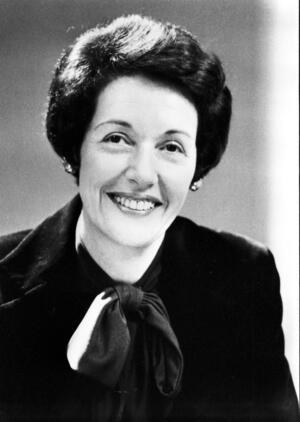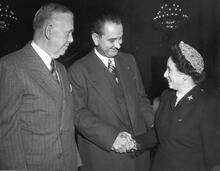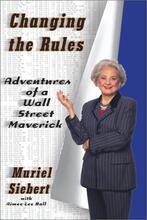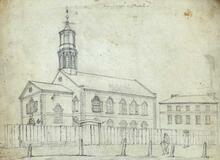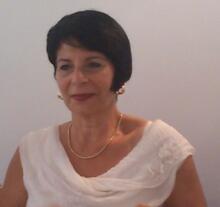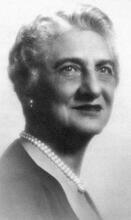Gertrude Geraldine Michelson
G. G. Michelson was a corporate and civic leader who broke barriers for women. Born in 1925 in southwestern New York State, she spent some of her childhood in orphanages when her family struggled during the Depression. Feeling young and inexperienced after receiving a B.A. in industrial psychology from Pennsylvania State University at the age of nineteen, she enrolled in Columbia Law School to develop analytic skills and get credentialed. After graduating, she joined the executive training program at Macy’s, where she spent the next 47 years. In 1989, she became the chair of Columbia University’s board of trustees, the first woman to head the board of an Ivy League institution. She served on many other boards (often as the only woman) and civic groups.
G. G. Michelson was a corporate and civic leader who broke barriers for women. As chair of Columbia University’s board of trustees from 1989 to 1992, she was the first woman to head the board of an Ivy League institution. She was the only female member of many corporate boards and was the first woman on the New York State Financial Control Board. She advised mayors and was on the boards of leading New York City civic organizations. In her pioneering 47-year executive career at Macy’s, she rose from management trainee to senior vice president, taking on key challenges and roles in the company. Most of her life she lived on 10th Street in Manhattan.
Early Challenges and Opportunities
Gertrude Geraldine Michelson was born on June 3, 1925, to Thomas and Celia (Cohen) Rosen in Jamestown, a southwestern New York State town where her parents were part of the small Jewish community. She was the youngest child, born after a sister and brother. Michelson’s parents had emigrated in their teens from the vicinity of Vilna in Russia, where they received whatever education they had. Her family struggled during the Depression and her childhood included stays in orphanages. When she was eleven, her mother died of tuberculosis. Because of her mother’s illness and her father’s businesses and curiosity, the family moved around to various parts of the United States.
In 1945 Michelson received a B.A. in industrial psychology from Penn State University. But graduating at nineteen, she felt young and inexperienced, so she enrolled in Columbia Law School. Her father disapproved of her studying law, but she wanted to develop strong analytic skills and get credentialed, and she was inspired by men she met who were going to law school. In 1947 she received her LL.B. from Columbia, one of six women in her class.
Never intending to practice law, Michelson joined the executive training program at Macy’s in New York, seeing opportunity for advancement in a corporation with a large female workforce. She was soon named assistant to the labor relations manager and, in 1963, vice president for employee personnel, becoming the store’s only female vice president. In the 1970s, as senior vice president for personnel, labor, and consumer relations, she ran Macy’s Bureau of Standards (a precursor of government consumer agencies) and its Comparison Shopping Office, and she negotiated with the Teamsters and fourteen locals representing a total of 20,000 employees. Macy’s called her their “consumer czarina,” and The Women’s Book of Records named her “the only woman in the United States to deal regularly with a major union.” From 1980 to 1992, she was senior vice president for external affairs, afterward becoming a director of Federated Department Stores (which had acquired Macy’s) until her retirement in 1996.
Michelson’s labor negotiations for Macy’s were often with male officials of the Teamsters and other unions. Her cousin Marcia Warner said, “She probably knew more about the Yankees than anyone in this city. That was her secret weapon … She could talk sports. It threw them off so bad to talk baseball with a woman that they didn’t know what to do” (New York Times, January 13, 2015).
Corporate and Civic Leader
By 1976, Michelson served on the board of directors of Macy’s, Harper and Row, Quaker Oats, Chubb, and General Electric; by 1981, of Stanley Works, Goodyear Tire, and Irving Trust. On these boards, she saw few women’s faces.
A Columbia University trustee beginning in 1980 during Michael Sovern’s tenure as president, Michelson was elected vice-chair of the board in 1985 and chair in 1989. She was known for her ability to get disparate groups in the university community to work well together. She was a leading advocate for the admission of women to Columbia College; and she hailed as a great satisfaction the Law School’s expanding inclusion of students of various backgrounds and life experiences.
Michelson also served as a director of the Rand Corporation and the Markle Foundation and was a member of the advisory council of Catalyst, a global non-profit that promotes women’s corporate leadership. From 1998 to 2000 she was president of the board of overseers of TIAA-CREF. She also became chair of the Helena Rubinstein Foundation, an honorary trustee of Spelman College, and a member of the Economic Club of New York and the Women’s Forum.
In 1977, Michelson was one of the best-known members of the New York City Business-Labor Working Group. Her many civic roles included membership on the New York State Financial Control Board and deputy chair of the New York Federal Reserve Bank. She was a member of the New York City Interracial Council on Business Opportunity, a director of the executive committee of the American Arbitration Association, and a member of the National Commission on Public Service. She was on mayoral committees including Edward Koch’s controversial commission on commercial rent control and Michael Bloomberg’s advisory commission reviewing the salaries of the mayor, comptroller, borough presidents, and other elected officials. Michelson was also a public governor of the American Stock Exchange, and vice-chair and director of the New York City Partnership.
Michelson received honorary doctorates from Adelphi University, New Rochelle College, Marymount Manhattan College, and the Rand Graduate School. She received Columbia University Law School’s James Kent Award, Barnard College’s Frederick Barnard Award, Catalyst’s Award for Contribution to Corporate Leadership, the American Women’s Economic Development (AWED) Award for Outstanding Contributions to Women’s Economic Development, the Girl Scout Women’s Achievement Award, and the NOW Legal Defense and Education Fund Equal Opportunity Award.
Family and Personal Life
In 1947 G. G. married Horace Michelson, who had served in the U.S. Army in World War II and been awarded the Bronze and Silver Stars and a Purple Heart. He was a corporate attorney with the firm of Moses and Singer, from which he retired in 1984; he died in 2002. Their older daughter, Martha Ann, died in a fire as a student at Goddard College. Their younger daughter, Barbara Jane, who attended Cornell University and the Paris Cordon Bleu, has long been involved professionally with food and wrote Leave Nothing on the Back Burner: My Happy Cooking Life (Opal Press, 2004). Michelson had three granddaughters and four great-grandchildren.
G.G. Michelson was known for her geniality, sharp intelligence, and resolve. New York City life meant a great deal to her. She emphasized the importance of civic leadership; believed government budgets should be balanced, but not on the backs of the poor; and felt that top law school education for needy, gifted students and those interested in public service merited real support. Her goal as a leader was not to promote women but rather to promote the integrity of organizations and the communities they serve. She felt, however, that doing her job well helped women by providing precedent and example.
Bender, Marylin. “Problems as Executive Aid Housewife.” New York Times, February 6, 1964.
Bender, Marylin. “Yankee Fan Confirms a Maxim: Nice Gals Finish First.” New York Times, December 20, 1970.
Brier, Evan. “District 65 Strikes Outside of Macy's.” Columbia Daily Spectator, November 18, 1991.
Cummings, Judith. “Notes on People: First Woman Named to State Financial Control Board.” New York Times, June 20, 1980.
Daniels, Lee A. “Columbia Trustee Head: A Low-Key Trailblazer.” New York Times, June 21, 1989.
“Distinguished Columbian: G.G. Michelson ’47.” Columbia Law School Report, Autumn 1996.
Duhigg, Charles. “G.G. Michelson, Macy’s Executive Who Broke Glass Ceilings, Dies at 89.” New York Times, January 13, 2015.
“Executive Suite: Gertrude G. Michelson.” In “Seventy-Five Most Influential Women,” edited by Cynthia Rigg and Pat Wechsler. Crain’s New York Business, March 25, 1996.
Fowler, Elizabeth M. “Women in Careers Are Honored.” New York Times, October 20, 1967.
“G.G. Michelson.” Who’s Who in America (1996).
Haberman, Clyde. “Three on State Panel Challenge Budget for New York City.” New York Times, May 12, 1982.
Lorsch, Jay W. and Rakesh Khurana. “Changing Leaders: The Board’s Role in CEO Succession, A Roundtable with Philip Caldwell, George D. Kennedy, G. G. Michelson, Henry Wendt, and Alfred M. Zeien.” In Harvard Business Review on Corporate Governance (2000).
Michelson, Gertrude G. Interview by Jane Mushabac, New York City, June 17, 1996.
“Michelson, Horace.” New York Times, April 15, 2002, sec. B, p. 6, classified.
“Only Woman Executive to Deal Regularly with a Major Union.” In Women’s Book of World Records and Achievements, edited by Lois Decker O’Neill. New York: Doubleday, 1979.
Prial, Frank J. “Mrs. Michelson Gets Two Posts in One Day.” New York Times, January 8, 1979.
Thorpe, Catherine. “Head Trustee Reflects After One Year (Interview).” Columbia Daily Spectator, November 26, 1990.
“Top Trustee Defends Sovern's Salary, Calls for More Housing; Michelson, in First Live Spec Interview, Also Calls Minority Hiring a Priority.” Columbia Daily Spectator, September 18, 1989.
Townsend, Alair. “A View from the Top: Alair Townsend Remembers Her Mentor.” Crain’s New York Business, March 25, 1996.
Walsh, Mary Williams. “Preparing a Corps of Women for Corporate Responsibility.” New York Times, August 13, 2002.

